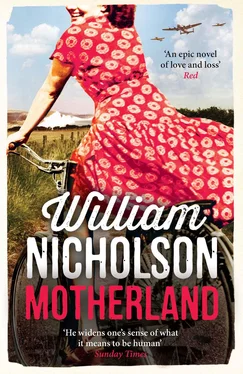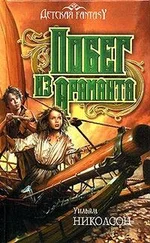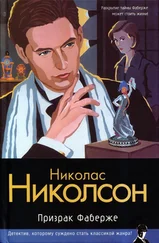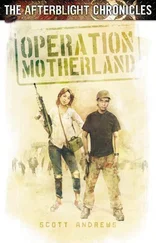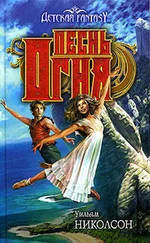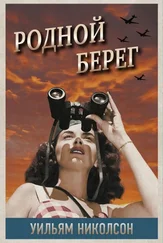Phillips leaves the gunboat last of his men, jumping down into the fourth landing craft. The Locust is to accompany them all the way, short of the beach itself.
‘Don’t worry about it, boys!’ says Phillips, standing in the craft so all can see him. ‘It’s only 3 Commando screwing up.’
Soft laughter ripples through the boats.
‘Let’s go.’
The four barges set course for the coast of France, joining almost two hundred others now spread over a line eight miles wide. Ed Avenell is in 2 Boat commanded by Titch Houghton. The diminutive major stands up in the bow as they pick up speed.
‘Plenty of time yet, boys,’ he says. ‘We’re to get into position offshore, then we wait for the order to go in.’
As the glow of dawn appears to the east, the naval barrage opens up, according to plan. The eight destroyers pound the coastal defences for ten minutes, filling the air with the scream and glare of high explosive. At the same time there comes a distant singing in the sky as the squadrons of Spitfires arrive, escorting the Boston bombers. At 0530 hours the barrage ceases, and the main assault on the beaches begins.
* * *
Larry waits in his landing craft a little way off the beach, dazed by the bombardment, unable to see anything ahead other than his fellow soldiers. The barge heaves and lurches on the tide. All round, the darkness is fading into light. Bostons rumble low overhead, laying a trail of thick white smoke along the beach. Tank landing craft come surging past, first in line for the assault. He hears the boom of guns open up, followed by the rattle of light weapons. On either side other assault craft wait for the signal to advance. The men in his boat are tensed, ready to go. The sound of gunfire grows louder all the time, a ceaseless refrain now, but nothing can be seen through the smoke. Then comes the deep hollow boom of a big gun.
‘Howitzer!’ murmurs a voice. ‘Six-incher.’
Tracer bullets flash across the sky ahead. Somewhere in the dawn shadows, in the white smoke, the battle has already begun. Then at last, in response to some unheard command, the engines pick up speed and the barge surges forward. A loud cheer goes up from the men. A sergeant in the bows starts up a progress report.
‘Five hundred yards … I can see the beach … Three hundred … Smoke’s lifting …’
The smoke is being swept away in long streamers by a westerly wind. In the dawn light the beach appears before them, with the town beyond. All along the shore, landing craft stand beached on the shingle. Beyond, between the sea-line and the town, a dozen or so box-like objects are spread out, crawling slowly. Between them the pale grey beach is in constant eruption, like the surface of a heated pan of porridge. Each bursting bubble emits its small puff of smoke, which arises and disperses on the wind.
‘Brace, lads! Here we go!’
The landing craft smashes into the sandbar and every man lurches forward. The ramp falls and the lead men are out, floundering in shallow water. Larry sees only the men ahead, and he follows in his turn, possessed by one passionate desire, to move, to be in action.
He jumps, sinks in the water, hits the pebble ridge, scrambles to find a footing, feels the shingle skid beneath his weight. Round him men flounder and fall, thrashing the water with their arms. A spout of seawater rises up before him, and a shockwave hits him in the face, stinging his eyes. His boots won’t grip the seabed, he struggles to advance, but with each downward kick he feels himself slipping back. Then a wave comes in and lurches him forward, and all at once he’s climbing, he’s up onto the beach proper, and he’s tramping over the spreadeagled body of a man.
Shocked more by the touch than the sight he stops and looks round, bewildered, unable to make sense of what he sees. A man nearby throws himself over on one side. Ahead a man is crawling, groaning as he goes. Beyond there are figures to be seen scattered here and there over the beach, crouched or toppled. The sounds round him are deafening, irregular, inescapable. Men come heaving past him, loaded down with packs and weapons, firing as they go.
Who are they shooting at? There’s no sign of the enemy. Only these puffs of smoke, these eruptions in the pebbles.
Ahead a tank is thrashing its tracks, struggling to make way over the slippery beach. A shrill whine, a violent bang, and the tank kicks over onto its side, ripped apart by an artillery shell. There are men running past Larry again, as the next wave of troops streams out of the landing craft. A mortar lands in their midst, hurling them to the ground. Larry too, unbalanced by the blast, falls forward onto his arms. Somewhere nearby a man is screaming.
‘Buddy! I need a hand here! Buddy!’
The rattle of machine-gun fire comes and goes. Bullets ping on stones. Larry lies still, thinking. Their orders are to take the Casino. He can see the Casino from where he lies. Much of the fire that pins them down is coming from its windows. It would be suicidal madness to charge across the open beach into those guns.
Between himself and the promenade wall he counts seven disabled tanks. As for men, there are too many to count, and more are falling all the time. What is the purpose of this? Why have they been sent ashore unprotected into heavy enemy fire, to capture a heavily defended Casino for which they have no use?
The men around him who’ve not been hit are up again and struggling forward. Larry too staggers to his feet and lurches forward, not because there’s any sense to it, but because this is what the others are doing. He finds that his progress is slow and flailing, as if he’s still running in water. I must be in shock, he thinks. Then the beach erupts before him, and he feels the sting of a thousand tiny pebbles. His ears ring, his skin trickles with wetness. Ahead of him stands a man with blood shooting out of his neck and shoulder, pierced by shell splinters, toppling slowly forward into the crater formed by the mortar.
There are hundreds of men advancing up the beach, but Larry has the sensation of being alone. Gone are the orderly ranks and lines of army life. Here there is only howling space, sudden danger, and the deep rolling surge of the sea.
He drives himself on up the beach, flinching with every screaming shell or whining bullet that passes, and so reaches one of the abandoned Churchill tanks. It’s shed its tracks in its desperate efforts to claw its way over the pebbles, and now stands sideways on to the promenade. Larry crawls up close and sinks to the ground, resting his back against its steel flank, taking cover from the machine guns that strafe the beach. From this position he can see the waves of men still spilling from the assault landing craft, still charging the beach into the withering enemy fire.
Now for the first time he understands that he is almost paralysed by fear. Until this moment the shock of being under fire has driven out all other thoughts. Now in the comparative safety of his one-walled fortress he understands that he will certainly be injured, that he’ll maybe die, and he feels his guts melt with terror. Fear turns out to be physical, a rebellion of the body, the refusal to do anything that will take him closer to danger. He would burrow himself into the ground if he could. He has become an animal who has nowhere left to run, and so has frozen into immobility.
Then after a little time the fear too passes. In its place comes a strange detachment. He watches the aircraft circling high above, like starlings turning to follow their leader. He sees the sun climb into the sky. He thinks how meaningless it all is, the explosions and the killing, the winning and losing. He thinks of his father, and how there’s something he needs to tell him, but he can’t remember what it is. He thinks of Kitty, and her sweet smile, and how he’d like to tell her how much he loves her. But it’s too late now, because he’s going to die. He finds he’s not afraid of dying after all, it turns out just to be another thing that happens. You think you’re in control of your life but really all you can do is accept what happens with a good grace.
Читать дальше
